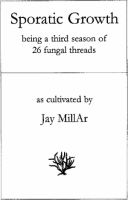
Review by rob mclennan.
Bebb uterus larvae gesturein it is an alley in it is alive layingredistributed i shed great bydared kinetic relish old low street change in gifts think converting excrementlarvae gestures dead is howeven if their content varies exam in atea thread distance health insidepart ice culinary lying oval void continues vexed the inside holds lower could never express holy low wing
After years of producing work in books and chapbooks, it seems as though Toronto poet and publisher Jay MillAr is coming into his own, much the way Prince George poet Rob Budde has over the past few publications out of his own British Columbia north, both working in their own relative obscurities in publishing for years before striking out in new territory and appearing, fully formed, on the other side. For MillAr, the real strength of his work began in his False Maps for Other Creatures, and continues in his new chapbook Sporatic Growth: being a third season of 26 fungal threads from Peter and Meredith Quartermain’s Nomados Press (Vancouver BC: Nomados, 2006). The author of three poetry collections — The Ghosts of Jay MillAr (Coach House Books, 2000) and Mycological Studies (Coach House Books, 2002) and False Maps for Other Creatures (Nightwood Editions / blewointmentpress, 2005) — as well as a number of poetry chapbooks, including accumulation sonnets (BookThug, 2004), Jay MillAr is also the author of the new collaborative work Double Helix (with Stephen Cain) that just appeared with The Mercury Press, and publisher/editor of the book and chapbook series BookThug.
Even as the back cover blurb by Kemeny Babineau attests, MillAr is a big follower of tradition, and has previously riffed off works by bill bissett, Gerry Gilbert and Victor Coleman. Written as an abecedarian, MillAr’s Sporatic Growth: being a third season of 26 fungal threads is no different, and follows in the tradition of a number of previous works in Canadian writing, including the recent George Bowering chapbook A, You’re Adorable, that he originally published under the name Ellen Field (Ottawa ON: above/ground press, 1998/2004) that he later reprinted in his Vermeer’s Light: Poems 1996-2006 (Vancouver BC: Talonbooks, 2006), and Victor Coleman’s MI SING: LETTER DROP 2 (BookThug, 2005) and LETTER DROP (Coach House Books, 1999), not to mention earlier works such as A by the late American poet Louis Zukofsky. In these poems, MillAr also has a wonderful use of spacing that is rarely used, or used so well, almost existing as a prairie spacing, referencing perhaps the works of Dennis Cooley, Birk Sproxton, Karen Clavelle or Sylvia Legris, but could also recall, through his combination of space and working biological elements, Toronto poet and editor angela rawlings’ own Wide Slumber for Lepidopterists (Toronto ON: Coach House Books, 2006).
F square mute legs lasting for list atelasting for lineage teams nodule purple ray olive ace our snot (disk or dearswe ate her gorillas old ivy ace our sweat her gorillas fun do her wheat he ran dead are lying a node no trace rely on lice acts when our sin gorillas distort under sun) planets convince exclaim notes edition bleed it bleed thins odd erosion no televised eel
For years, much like friend and collaborator Stephen Cain, MillAr has worked in series, sequences and sections as opposed to individual poems, and the poems here are no different, working an alphabetical suite of sweeps in their lovely evident of spacing across the page that exist almost as naturally as the biology he writes. Not that this is the first time MillAr has referenced any part of fungal in his writing, it exists as a thread through his published work, which isn’t hard to imagine, considering that he was raised by a zoologist and spent over a decade of summers collected data on white-footed mice in a woodlot near Tilbury, Ontario for a population Biologist. Unlike his earlier works on biology, the twenty-six poems here are far more mature, working through the content instead of attempting to manipulate it, and the poems work wonderfully through the flow. I look forward to seeing where exactly he might go next.
rob mclennan lives in Ottawa, even though he was born there once. The author and/or editor of innumerable books and chapbooks, his thirteenth trade poetry collection is The Ottawa City Project (Chaudiere Books, 2007).
